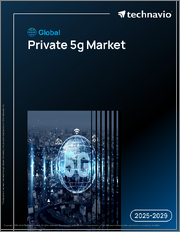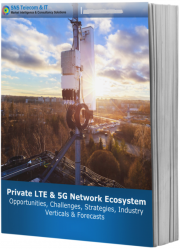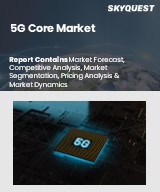
|
시장보고서
상품코드
1843992
5G 코어 네트워크 시장 보고서(2025년)5G Core Network Global Market Report 2025 |
||||||
5G 코어 네트워크 시장 규모는 최근 급격히 확대되고 있습니다. 2024년 27억 8,000만 달러에서 2025년에는 34억 7,000만 달러에 달할 것으로 추정되고, CAGR 24.8%로 성장이 예측됩니다. 역사적인 기간의 성장은 저지연 요구 사항, 대규모 IoT 연결, 서비스 기반 아키텍처, 보안 강화 및 세계 연결에 기인합니다.
5G 코어 네트워크 시장 규모는 향후 수년간 비약적인 성장이 예상됩니다. 2029년에는 CAGR 21.8%로 성장할 전망이며, 76억 2,000만 달러로 성장이 예측됩니다. 예측 기간의 성장은 엣지 컴퓨팅 통합, 5G 대응 수직 산업, 정부의 이니셔티브 및 정책, 경쟁 차별화, 네트워크 근대화에 기인합니다. 예측 기간 주요 동향으로는 5G 지원 IoT 솔루션, 네트워크 자동화 및 오케스트레이션, 네트워크 동기화, 네트워크 보안 강화, 5G 코어 네트워크 진화 등이 있습니다.
5G 코어 네트워크는 5세대(5G) 셀룰러 네트워크 아키텍처의 핵심 인프라를 구성하고 네트워크 기능과 서비스의 조정 및 관리를 담당합니다. 5G 네트워크의 기반으로 초저지연, 고속 데이터 전송, 대용량 연결, 네트워크 슬라이싱 등의 최첨단 기능을 실현합니다.
5G 코어 네트워크의 주요 구성 요소에는 솔루션과 서비스가 포함됩니다. 5G 상용 계약은 5G 기술과 서비스의 취득 및 구현을 위해 서비스 제공업체, 공급업체, 정부 기관 간에 확립된 계약 및 계약을 나타냅니다. 클라우드 기반 및 온프레미스 셋업을 포함한 다양한 모델로 전개 가능하며 스마트 에너지, 산업 제조, 스마트 의료 솔루션, 미디어 엔터테인먼트, 스마트 교통 등 다양한 용도를 지원합니다. 그 채용은 통신 사업자와 기업을 포함한 여러 최종 사용자에게 퍼져 있습니다.
2025년 봄, 미국 관세의 급상승과 이에 따른 무역 마찰은 정보 기술 분야, 특히 하드웨어 제조, 데이터 인프라, 소프트웨어 전개에 큰 영향을 미쳤습니다. 수입 반도체, 회로 기판, 네트워크 장비에 대한 관세 인상은 하이테크 기업, 클라우드 서비스 공급자, 데이터센터의 생산 및 운영 비용을 밀어 올리고 있습니다. 노트북, 서버, 가전제품 부품을 세계로 조달하고 있는 기업들은 리드 타임의 장기화와 가격 압력에 직면하고 있습니다. 동시에 특수 소프트웨어에 대한 관세와 주요 국제 시장의 보복 조치로 세계 IT 공급망이 혼란스럽고 미국 기술에 대한 해외 수요가 줄어들고 있습니다. 이에 대응하기 위해, 이 분야는 국내 칩 생산에 대한 투자를 강화하고, 공급자 네트워크를 확대하며, AI를 활용한 자동화에 의해 회복력을 높이고, 비용 관리를 효율화하고 있습니다.
5G 코어 네트워크 시장 조사 보고서는 5G 코어 네트워크 업계의 세계 시장 규모, 지역 점유율, 5G 코어 네트워크 시장 점유율을 가진 경쟁업체, 상세한 5G 코어 네트워크 시장 부문, 시장 동향 및 비즈니스 기회 등 5G 코어 네트워크 시장 통계를 제공하는 The Business Research Company의 최신 보고서 시리즈 중 하나입니다. 이 5G 코어 네트워크 시장 조사 보고서는 업계의 현재 및 미래 시나리오를 자세히 분석하고 필요한 모든 것을 완벽한 관점에서 제공합니다.
향후 5년간의 성장률 21.8%라고 하는 예측은 전회 예측으로부터 0.1%라는 미감소를 반영하고 있습니다. 이 감소는 주로 미국과 타국 간 관세의 영향 때문입니다. 핀란드와 이스라엘의 가상화 도구가 공급망 지연에 직면하고 독립형 5G 네트워크의 채택이 지연됨으로써 미국에 직접 영향을 미칠 가능성이 높습니다. 또한 상호관세와 무역 긴장 증가 및 한계 증가로 인한 세계 경제와 무역에 대한 악영향으로 영향이 보다 광범위해질 것으로 보입니다.
5G 서비스의 채용 확대가 당면 5G 코어 네트워크 시장 확대의 원동력이 될 것으로 보입니다. 5G 서비스에는 5세대 무선 셀룰러 기술로 구현되는 다양한 애플리케이션 및 이용 사례가 포함됩니다. 이러한 채용의 급증은 고속 데이터 전송 수요, 접속 디바이스의 급증, IoT 애플리케이션의 출현에 의해 뒷받침되고 있습니다. 5G 코어 네트워크는 다양한 5G 서비스의 백본 역할을 하며 5G 기술의 잠재력을 완전히 끌어내는 데 필요한 인프라와 기능을 제공합니다. 확장 모바일 광대역(eMBB), 대규모 머신 통신(mMTC) 및 초신뢰 저지연 통신(UR-LLC)을 포함한 광범위한 서비스를 지원하도록 설계된 5G 코어 네트워크는 5G 기술의 약속을 실현하는 데 매우 중요한 역할을 하고 있습니다. 예를 들어 미국에 본사를 둔 업계 단체 5G Americas의 데이터에 따르면 세계 5G 무선 연결의 급증은 눈에 띄었고, 2022년 말까지 10억 5,000만에 달했으며, 전년 대비 76% 증가를 기록했습니다. 예측은 2027년 말까지 59억 접속으로 더욱 확대될 예정입니다. 따라서 5G 서비스의 채용 확대가 5G 코어 네트워크 시장의 성장 궤도를 추진하는 중요한 요인이 되고 있습니다.
5G 코어 네트워크 시장의 주요 기업은 SaaS(Software-as-a-Service)와 같은 개발을 통해 기술을 진보시켜 네트워크의 효율성, 확장성, 비용 효율성을 높이고 있습니다. SaaS(Software-as-a-Service)는 공급업체가 소프트웨어 애플리케이션을 호스팅하고 사용자가 인터넷을 통해 액세스하는 클라우드 기반 서비스 모델입니다. 예를 들어 핀란드를 기반으로 한 통신, 정보 기술, 가전의 다국적 기업인 노키아 코퍼레이션은 2022년 11월 5G용 Core Software-as-a-Service(SaaS)를 발표했습니다. Core SaaS는 SaaS 모델을 통해 클라우드 네이티브 네트워크 기능을 모두 제공하는 최초의 종합적인 5G 코어 솔루션입니다. Core SaaS는 통신 서비스 제공업체(CSP)와 기업이 유연성과 확장성을 높이고 네트워크를 관리하며, 비즈니스 민첩성을 높이고, 네트워크 서비스 수익화를 가속화할 수 있도록 설계되었습니다. 사설 인프라에 기존의 맞춤형 소프트웨어 설치에서 구독 기반 모델로 마이그레이션함으로써 운영자는 대규모 선행 자본 투자를 피하고 현장에서 소프트웨어 유지 관리 및 업데이트의 필요성을 제거할 수 있습니다.
2023년 6월 미국의 주요 정보기술 기업인 휴렛 팩커드 엔터프라이즈(HPE)는 비공개 금액으로 Athonet Srl 인수를 완료했습니다. 이 전략적 움직임을 통해 HPE는 사설 네트워킹 기능을 기업으로 직접 확장하여 Aruba 네트워킹 포트폴리오를 강화할 수 있습니다. 동시에 통신 서비스 제공업체(CSP)가 고객을 위해 5G 사설망을 신속하게 전개할 수 있습니다. 이탈리아에 본사를 둔 Athonet Srl은 모바일 코어 네트워크 기술에 특화되어 진화하는 5G 인프라에서 매우 중요한 구성 요소인 Athonet 5G Core 솔루션으로 알려져 있습니다.
5G 코어 네트워크 시장에는 머신형 통신, 이동성 관리, 인증 및 허가, 트래픽 관리, 정책 제어 등의 서비스를 통해 기업이 얻는 수익이 포함됩니다. 시장 가치에는 서비스 제공업체가 판매하거나 서비스 제공 제품에 포함된 관련 상품의 가치가 포함됩니다. 기업 간에 거래되거나 최종 소비자에게 판매되는 재화 및 서비스만 포함됩니다.
목차
제1장 주요 요약
제2장 시장 특징
제3장 시장 동향 및 전략
제4장 시장 : 금리, 인플레이션, 지정학, 무역전쟁 및 관세, 그리고 코로나 및 회복이 시장에 미치는 영향을 포함한 거시경제 시나리오
제5장 세계의 성장 분석 및 전략 분석 프레임워크
- 세계의 5G 코어 네트워크 : PESTEL 분석(정치, 사회, 기술, 환경, 법적 요인, 촉진요인 및 억제요인)
- 최종 이용 산업의 분석
- 세계의 5G 코어 네트워크 시장 : 성장률 분석
- 세계의 5G 코어 네트워크 시장 실적 : 규모 및 성장(2019-2024년)
- 세계의 5G 코어 네트워크 시장 예측 : 규모 및 성장(2024-2029년, 2034년)
- 세계의 5G 코어 네트워크 : 총 잠재 시장 규모(TAM)
제6장 시장 세분화
- 세계의 5G 코어 네트워크 시장 : 컴포넌트별 분석 및 예측(2019-2024년, 2024-2029년, 2034년)
- 솔루션
- 서비스
- 세계의 5G 코어 네트워크 시장 : 전개 모델별 분석 및 예측(2019-2024년, 2024-2029년, 2034년)
- 클라우드
- 온프레미스
- 세계의 5G 코어 네트워크 시장 : 용도별 분석 및 예측(2019-2024년, 2024-2029년, 2034년)
- 스마트 에너지
- 공업 제조업
- 스마트 메디컬
- 미디어 엔터테인먼트
- 스마트 교통
- 세계의 5G 코어 네트워크 시장 : 최종 사용자별 분석 및 예측(2019-2024년, 2024-2029년, 2034년)
- 통신 사업자
- 기업
- 세계의 5G 코어 네트워크 시장 : 솔루션 유형별 세분화 분석 및 예측(2019-2024년, 2024-2029년, 2034년)
- 네트워크 기능 가상화(NFV)
- 소프트웨어 정의 네트워크(SDN)
- 클라우드 네이티브 코어
- 데이터 분석 및 관리
- 보안 솔루션
- 세계의 5G 코어 네트워크 시장 : 서비스 유형별 세분화 분석 및 예측(2019-2024년, 2024-2029년, 2034년)
- 컨설팅 서비스
- 통합 서비스
- 유지보수 및 지원 서비스
- 매니지드 서비스
제7장 지역별 및 국가별 분석
- 세계의 5G 코어 네트워크 시장 : 지역별 분석 및 예측(2019-2024년, 2024-2029년, 2034년)
- 세계의 5G 코어 네트워크 시장 : 국가별 분석 및 예측(2019-2024년, 2024-2029년, 2034년)
제8장 아시아태평양 시장
제9장 중국 시장
제10장 인도 시장
제11장 일본 시장
제12장 호주 시장
제13장 인도네시아 시장
제14장 한국 시장
제15장 서유럽 시장
제16장 영국 시장
제17장 독일 시장
제18장 프랑스 시장
제19장 이탈리아 시장
제20장 스페인 시장
제21장 동유럽 시장
제22장 러시아 시장
제23장 북미 시장
제24장 미국 시장
제25장 캐나다 시장
제26장 남미 시장
제27장 브라질 시장
제28장 중동 시장
제29장 아프리카 시장
제30장 경쟁 구도 및 기업 프로파일
- 5G 코어 네트워크 시장 : 경쟁 구도
- 5G 코어 네트워크 시장 : 기업 프로파일
- Samsung Electronics Co. Ltd. : 개요, 제품 및 서비스, 전략 및 재무 분석
- Reliance Industries Limited : 개요, 제품 및 서비스, 전략 및 재무 분석
- Dell Technologies Inc. : 개요, 제품 및 서비스, 전략 및 재무 분석
- Huawei Technologies Co. Ltd. : 개요, 제품 및 서비스, 전략 및 재무 분석
- Intel Corporation : 개요, 제품 및 서비스, 전략 및 재무 분석
제31장 기타 주요 기업 및 혁신 기업
- Cisco Systems Inc.
- Qualcomm Incorporated
- Oracle Corporation
- Fujitsu Limited
- Hewlett Packard Enterprise Company
- Telefonaktiebolaget LM Ericsson
- Nokia Corporation
- NEC Corporation
- ZTE Corporation
- VMware Inc.
- Juniper Networks Inc.
- Ciena Corporation
- Mavenir Systems Inc.
- Ribbon Communications Inc.
- Casa Systems Inc.
제32장 세계 시장 경쟁 벤치마킹 및 대시보드
제33장 주요 인수합병(M&A)
제34장 최근 시장 동향
제35장 시장의 잠재력이 높은 국가, 부문 및 전략
- 5G 코어 네트워크 시장(2029년) : 새로운 기회를 제공하는 국가
- 5G 코어 네트워크 시장(2029년) : 새로운 기회를 제공하는 부문
- 5G 코어 네트워크 시장(2029년) : 성장 전략
- 시장 동향에 기초한 전략
- 경쟁 전략
제36장 부록
AJY 25.10.24The 5G Core Network constitutes the central infrastructure of a 5th generation (5G) cellular network architecture, responsible for coordinating and managing network functions and services. Serving as the foundation of the 5G network, it enables cutting-edge capabilities such as ultra-low latency, high-speed data transmission, massive connectivity, and network slicing.
The primary components of the 5G core network encompass solutions and services. 5G commercial contracts denote the agreements and arrangements established among service providers, vendors, and government entities for the acquisition and implementation of 5G technology and services. Deployable in various models, including cloud-based and on-premises setups, it caters to diverse applications such as smart energy, industrial manufacturing, smart medical solutions, media entertainment, and smart transportation. Its adoption spans across multiple end-users, including telecom operators and enterprises.
Note that the outlook for this market is being affected by rapid changes in trade relations and tariffs globally. The report will be updated prior to delivery to reflect the latest status, including revised forecasts and quantified impact analysis. The report's Recommendations and Conclusions sections will be updated to give strategies for entities dealing with the fast-moving international environment.
The sharp rise in U.S. tariffs and the ensuing trade tensions in spring 2025 are having a significant impact on the information technology sector, especially in hardware manufacturing, data infrastructure, and software deployment. Increased duties on imported semiconductors, circuit boards, and networking equipment have driven up production and operating costs for tech companies, cloud service providers, and data centers. Firms that depend on globally sourced components for laptops, servers, and consumer electronics are grappling with extended lead times and mounting pricing pressures. At the same time, tariffs on specialized software and retaliatory actions by key international markets have disrupted global IT supply chains and dampened foreign demand for U.S.-made technologies. In response, the sector is ramping up investments in domestic chip production, broadening its supplier network, and leveraging AI-powered automation to improve resilience and manage costs more effectively.
The 5G core network market research report is one of a series of new reports from The Business Research Company that provides 5G core network market statistics, including 5G core network industry global market size, regional shares, competitors with a 5G core network market share, detailed 5G core network market segments, market trends and opportunities, and any further data you may need to thrive in the 5G core network industry. This 5G core network market research report delivers a complete perspective of everything you need, with an in-depth analysis of the current and future scenario of the industry.
The 5G core network market size has grown exponentially in recent years. It will grow from $2.78 billion in 2024 to $3.47 billion in 2025 at a compound annual growth rate (CAGR) of 24.8%. The growth in the historic period can be attributed to low latency requirements, massive IoT connectivity, service-based architecture, enhanced security, global connectivity.
The 5G core network market size is expected to see exponential growth in the next few years. It will grow to $7.62 billion in 2029 at a compound annual growth rate (CAGR) of 21.8%. The growth in the forecast period can be attributed to edge computing integration, 5G -enabled vertical industries, government initiatives and policies, competitive differentiation, network modernization. Major trends in the forecast period include 5G -enabled IoT solutions, network automation and orchestration, network synchronization, network security enhancements, 5G core network evolution.
The forecast of 21.8% growth over the next five years reflects a slight reduction of 0.1% from the previous projection. This reduction is primarily due to the impact of tariffs between the US and other countries. This is likely to directly affect the US by slowing the adoption of standalone 5G networks, as virtualization tools from Finland and Israel face supply chain delays. The effect will also be felt more widely due to reciprocal tariffs and the negative effect on the global economy and trade due to increased trade tensions and restrictions.
The increasing adoption of 5G services is poised to drive the expansion of the 5G core network market in the foreseeable future. 5G services encompass a variety of applications and use cases enabled by fifth-generation wireless cellular technology. This adoption surge is fueled by the demand for high-speed data transmission, the proliferation of connected devices, and the emergence of IoT applications. The 5G core network serves as the backbone for a diverse array of 5G services, furnishing the requisite infrastructure and capabilities to fully unlock the potential of 5G technology. Designed to support an extensive range of services including enhanced mobile broadband (eMBB), massive machine-type communications (mMTC), and ultra-reliable low-latency communications (UR-LLC), the 5G core network plays a pivotal role in realizing the promises of 5G technology. For example, data from 5G Americas, a US-based industry trade organization, revealed a remarkable surge in global 5G wireless connections, reaching 1.05 billion by the end of 2022, marking a 76% increase from the previous year. Projections indicate a further escalation to 5.9 billion connections by the end of 2027. Hence, the growing adoption of 5G services emerges as a key driver propelling the growth trajectory of the 5G core network market.
Leading companies in the 5G core network market are advancing technology through developments like Software-as-a-Service (SaaS) to enhance network efficiency, scalability, and cost-effectiveness. Software-as-a-Service (SaaS) is a cloud-based service model where software applications are hosted by a provider and accessed by users over the internet. For example, in November 2022, Nokia Corporation, a Finland-based multinational telecommunications, information technology, and consumer electronics corporation, introduced Core Software-as-a-Service (SaaS) for 5G. Core SaaS is the first comprehensive 5G core solution that offers all core cloud-native network functions via a SaaS model. Core SaaS is designed to allow communication service providers (CSPs) and enterprises to manage their networks with increased flexibility and scalability, enhancing business agility and accelerating network service monetization. By shifting from traditional, customized software installations on private infrastructure to a subscription-based model, operators can avoid large upfront capital investments and eliminate the need for on-site software maintenance and updates.
In June 2023, Hewlett-Packard Enterprise (HPE), a leading US-based information technology corporation, finalized the acquisition of Athonet Srl for an undisclosed sum. This strategic move empowers HPE to extend private networking functionalities directly to enterprises, enriching its Aruba networking portfolio. Simultaneously, it facilitates Communication Service Providers (CSPs) in expeditiously deploying private 5G networks for their clientele. Athonet Srl, headquartered in Italy, specializes in mobile core network technologies and is renowned for its Athonet 5G Core solution, which represents a pivotal component in the evolving landscape of 5G infrastructure.
Major companies operating in the 5G core network market are Samsung Electronics Co. Ltd., Reliance Industries Limited, Dell Technologies Inc., Huawei Technologies Co. Ltd., Intel Corporation, Cisco Systems Inc., Qualcomm Incorporated, Oracle Corporation, Fujitsu Limited, Hewlett Packard Enterprise Company, Telefonaktiebolaget LM Ericsson, Nokia Corporation, NEC Corporation, ZTE Corporation, VMware Inc., Juniper Networks Inc., Ciena Corporation, Mavenir Systems Inc., Ribbon Communications Inc., Casa Systems Inc., Parallel Wireless Inc., Altiostar Networks Inc., Affirmed Networks, Druid Software Ltd., Athonet S.r.l.
Asia-Pacific was the largest region in the 5G core network market in 2024. It is expected to be the fastest-growing region in the forecast period. The regions covered in the 5g core network market report are Asia-Pacific, Western Europe, Eastern Europe, North America, South America, Middle East, Africa.
The countries covered in the 5g core network market report are Australia, Brazil, China, France, Germany, India, Indonesia, Japan, Russia, South Korea, UK, USA, Canada, Italy, Spain.
The 5G Core Network market includes revenues earned by entities by services such as machine-type communication, mobility management, authentication and authorization, traffic management, and policy control. The market value includes the value of related goods sold by the service provider or included within the service offering. Only goods and services traded between entities or sold to end consumers are included.
The market value is defined as the revenues that enterprises gain from the sale of goods and/or services within the specified market and geography through sales, grants, or donations in terms of the currency (in USD, unless otherwise specified).
The revenues for a specified geography are consumption values that are revenues generated by organizations in the specified geography within the market, irrespective of where they are produced. It does not include revenues from resales along the supply chain, either further along the supply chain or as part of other products.
5G Core Network Global Market Report 2025 from The Business Research Company provides strategists, marketers and senior management with the critical information they need to assess the market.
This report focuses on 5g core network market which is experiencing strong growth. The report gives a guide to the trends which will be shaping the market over the next ten years and beyond.
Reasons to Purchase
- Gain a truly global perspective with the most comprehensive report available on this market covering 15 geographies.
- Assess the impact of key macro factors such as geopolitical conflicts, trade policies and tariffs, post-pandemic supply chain realignment, inflation and interest rate fluctuations, and evolving regulatory landscapes.
- Create regional and country strategies on the basis of local data and analysis.
- Identify growth segments for investment.
- Outperform competitors using forecast data and the drivers and trends shaping the market.
- Understand customers based on the latest market shares.
- Benchmark performance against key competitors.
- Suitable for supporting your internal and external presentations with reliable high quality data and analysis
- Report will be updated with the latest data and delivered to you within 2-3 working days of order along with an Excel data sheet for easy data extraction and analysis.
- All data from the report will also be delivered in an excel dashboard format.
Where is the largest and fastest growing market for 5g core network ? How does the market relate to the overall economy, demography and other similar markets? What forces will shape the market going forward, including technological disruption, regulatory shifts, and changing consumer preferences? The 5g core network market global report from the Business Research Company answers all these questions and many more.
The report covers market characteristics, size and growth, segmentation, regional and country breakdowns, competitive landscape, market shares, trends and strategies for this market. It traces the market's historic and forecast market growth by geography.
- The market characteristics section of the report defines and explains the market.
- The market size section gives the market size ($b) covering both the historic growth of the market, and forecasting its development.
- The forecasts are made after considering the major factors currently impacting the market. These include:
The forecasts are made after considering the major factors currently impacting the market. These include the technological advancements such as AI and automation, Russia-Ukraine war, trade tariffs (government-imposed import/export duties), elevated inflation and interest rates.
- Market segmentations break down the market into sub markets.
- The regional and country breakdowns section gives an analysis of the market in each geography and the size of the market by geography and compares their historic and forecast growth.
- The competitive landscape chapter gives a description of the competitive nature of the market, market shares, and a description of the leading companies. Key financial deals which have shaped the market in recent years are identified.
- The trends and strategies section analyses the shape of the market as it emerges from the crisis and suggests how companies can grow as the market recovers.
Scope
- Markets Covered:1) By Components: Solutions; Services
- 2) By Deployment Model: Cloud; On-Premises
- 3) By Application: Smart Energy; Industrial Manufacturing; Smart Medical; Media Entertainment; Smart Transportation
- 4) By End User: Telecom Operators; Enterprises
- Subsegments:
- 1) By Solutions: Network Functions Virtualization (NFV); Software-Defined Networking (SDN); Cloud-Native Core; Data Analytics And Management; Security Solutions
- 2) By Services: Consulting Services; Integration Services; Maintenance And Support Services; Managed Services
- Companies Mentioned: Samsung Electronics Co. Ltd.; Reliance Industries Limited; Dell Technologies Inc.; Huawei Technologies Co. Ltd.; Intel Corporation; Cisco Systems Inc.; Qualcomm Incorporated; Oracle Corporation; Fujitsu Limited; Hewlett Packard Enterprise Company; Telefonaktiebolaget LM Ericsson; Nokia Corporation; NEC Corporation; ZTE Corporation; VMware Inc.; Juniper Networks Inc.; Ciena Corporation; Mavenir Systems Inc.; Ribbon Communications Inc.; Casa Systems Inc.; Parallel Wireless Inc.; Altiostar Networks Inc.; Affirmed Networks; Druid Software Ltd.; Athonet S.r.l.
- Countries: Australia; Brazil; China; France; Germany; India; Indonesia; Japan; Russia; South Korea; UK; USA; Canada; Italy; Spain
- Regions: Asia-Pacific; Western Europe; Eastern Europe; North America; South America; Middle East; Africa
- Time Series: Five years historic and ten years forecast.
- Data: Ratios of market size and growth to related markets, GDP proportions, expenditure per capita,
- Data Segmentations: country and regional historic and forecast data, market share of competitors, market segments.
- Sourcing and Referencing: Data and analysis throughout the report is sourced using end notes.
- Delivery Format: PDF, Word and Excel Data Dashboard.
Table of Contents
1. Executive Summary
2. 5G Core Network Market Characteristics
3. 5G Core Network Market Trends And Strategies
4. 5G Core Network Market - Macro Economic Scenario Including The Impact Of Interest Rates, Inflation, Geopolitics, Trade Wars and Tariffs, And Covid And Recovery On The Market
- 4.1. Supply Chain Impact from Tariff War & Trade Protectionism
5. Global 5G Core Network Growth Analysis And Strategic Analysis Framework
- 5.1. Global 5G Core Network PESTEL Analysis (Political, Social, Technological, Environmental and Legal Factors, Drivers and Restraints)
- 5.2. Analysis Of End Use Industries
- 5.3. Global 5G Core Network Market Growth Rate Analysis
- 5.4. Global 5G Core Network Historic Market Size and Growth, 2019 - 2024, Value ($ Billion)
- 5.5. Global 5G Core Network Forecast Market Size and Growth, 2024 - 2029, 2034F, Value ($ Billion)
- 5.6. Global 5G Core Network Total Addressable Market (TAM)
6. 5G Core Network Market Segmentation
- 6.1. Global 5G Core Network Market, Segmentation By Components, Historic and Forecast, 2019-2024, 2024-2029F, 2034F, $ Billion
- Solutions
- Services
- 6.2. Global 5G Core Network Market, Segmentation By Deployment Model, Historic and Forecast, 2019-2024, 2024-2029F, 2034F, $ Billion
- Cloud
- On-Premises
- 6.3. Global 5G Core Network Market, Segmentation By Application, Historic and Forecast, 2019-2024, 2024-2029F, 2034F, $ Billion
- Smart Energy
- Industrial Manufacturing
- Smart Medical
- Media Entertainment
- Smart Transportation
- 6.4. Global 5G Core Network Market, Segmentation By End User, Historic and Forecast, 2019-2024, 2024-2029F, 2034F, $ Billion
- Telecom Operators
- Enterprises
- 6.5. Global 5G Core Network Market, Sub-Segmentation Of Solutions, By Type, Historic and Forecast, 2019-2024, 2024-2029F, 2034F, $ Billion
- Network Functions Virtualization (NFV)
- Software-Defined Networking (SDN)
- Cloud-Native Core
- Data Analytics And Management
- Security Solutions
- 6.6. Global 5G Core Network Market, Sub-Segmentation Of Services, By Type, Historic and Forecast, 2019-2024, 2024-2029F, 2034F, $ Billion
- Consulting Services
- Integration Services
- Maintenance And Support Services
- Managed Services
7. 5G Core Network Market Regional And Country Analysis
- 7.1. Global 5G Core Network Market, Split By Region, Historic and Forecast, 2019-2024, 2024-2029F, 2034F, $ Billion
- 7.2. Global 5G Core Network Market, Split By Country, Historic and Forecast, 2019-2024, 2024-2029F, 2034F, $ Billion
8. Asia-Pacific 5G Core Network Market
- 8.1. Asia-Pacific 5G Core Network Market Overview
- Region Information, Market Information, Background Information, Government Initiatives, Regulations, Regulatory Bodies, Major Associations, Taxes Levied, Corporate Tax Structure, Investments, Major Companies
- 8.2. Asia-Pacific 5G Core Network Market, Segmentation By Components, Historic and Forecast, 2019-2024, 2024-2029F, 2034F, $ Billion
- 8.3. Asia-Pacific 5G Core Network Market, Segmentation By Deployment Model, Historic and Forecast, 2019-2024, 2024-2029F, 2034F, $ Billion
- 8.4. Asia-Pacific 5G Core Network Market, Segmentation By Application, Historic and Forecast, 2019-2024, 2024-2029F, 2034F, $ Billion
9. China 5G Core Network Market
- 9.1. China 5G Core Network Market Overview
- 9.2. China 5G Core Network Market, Segmentation By Components, Historic and Forecast, 2019-2024, 2024-2029F, 2034F,$ Billion
- 9.3. China 5G Core Network Market, Segmentation By Deployment Model, Historic and Forecast, 2019-2024, 2024-2029F, 2034F,$ Billion
- 9.4. China 5G Core Network Market, Segmentation By Application, Historic and Forecast, 2019-2024, 2024-2029F, 2034F,$ Billion
10. India 5G Core Network Market
- 10.1. India 5G Core Network Market, Segmentation By Components, Historic and Forecast, 2019-2024, 2024-2029F, 2034F, $ Billion
- 10.2. India 5G Core Network Market, Segmentation By Deployment Model, Historic and Forecast, 2019-2024, 2024-2029F, 2034F, $ Billion
- 10.3. India 5G Core Network Market, Segmentation By Application, Historic and Forecast, 2019-2024, 2024-2029F, 2034F, $ Billion
11. Japan 5G Core Network Market
- 11.1. Japan 5G Core Network Market Overview
- 11.2. Japan 5G Core Network Market, Segmentation By Components, Historic and Forecast, 2019-2024, 2024-2029F, 2034F, $ Billion
- 11.3. Japan 5G Core Network Market, Segmentation By Deployment Model, Historic and Forecast, 2019-2024, 2024-2029F, 2034F, $ Billion
- 11.4. Japan 5G Core Network Market, Segmentation By Application, Historic and Forecast, 2019-2024, 2024-2029F, 2034F, $ Billion
12. Australia 5G Core Network Market
- 12.1. Australia 5G Core Network Market, Segmentation By Components, Historic and Forecast, 2019-2024, 2024-2029F, 2034F, $ Billion
- 12.2. Australia 5G Core Network Market, Segmentation By Deployment Model, Historic and Forecast, 2019-2024, 2024-2029F, 2034F, $ Billion
- 12.3. Australia 5G Core Network Market, Segmentation By Application, Historic and Forecast, 2019-2024, 2024-2029F, 2034F, $ Billion
13. Indonesia 5G Core Network Market
- 13.1. Indonesia 5G Core Network Market, Segmentation By Components, Historic and Forecast, 2019-2024, 2024-2029F, 2034F, $ Billion
- 13.2. Indonesia 5G Core Network Market, Segmentation By Deployment Model, Historic and Forecast, 2019-2024, 2024-2029F, 2034F, $ Billion
- 13.3. Indonesia 5G Core Network Market, Segmentation By Application, Historic and Forecast, 2019-2024, 2024-2029F, 2034F, $ Billion
14. South Korea 5G Core Network Market
- 14.1. South Korea 5G Core Network Market Overview
- 14.2. South Korea 5G Core Network Market, Segmentation By Components, Historic and Forecast, 2019-2024, 2024-2029F, 2034F, $ Billion
- 14.3. South Korea 5G Core Network Market, Segmentation By Deployment Model, Historic and Forecast, 2019-2024, 2024-2029F, 2034F, $ Billion
- 14.4. South Korea 5G Core Network Market, Segmentation By Application, Historic and Forecast, 2019-2024, 2024-2029F, 2034F, $ Billion
15. Western Europe 5G Core Network Market
- 15.1. Western Europe 5G Core Network Market Overview
- 15.2. Western Europe 5G Core Network Market, Segmentation By Components, Historic and Forecast, 2019-2024, 2024-2029F, 2034F, $ Billion
- 15.3. Western Europe 5G Core Network Market, Segmentation By Deployment Model, Historic and Forecast, 2019-2024, 2024-2029F, 2034F, $ Billion
- 15.4. Western Europe 5G Core Network Market, Segmentation By Application, Historic and Forecast, 2019-2024, 2024-2029F, 2034F, $ Billion
16. UK 5G Core Network Market
- 16.1. UK 5G Core Network Market, Segmentation By Components, Historic and Forecast, 2019-2024, 2024-2029F, 2034F, $ Billion
- 16.2. UK 5G Core Network Market, Segmentation By Deployment Model, Historic and Forecast, 2019-2024, 2024-2029F, 2034F, $ Billion
- 16.3. UK 5G Core Network Market, Segmentation By Application, Historic and Forecast, 2019-2024, 2024-2029F, 2034F, $ Billion
17. Germany 5G Core Network Market
- 17.1. Germany 5G Core Network Market, Segmentation By Components, Historic and Forecast, 2019-2024, 2024-2029F, 2034F, $ Billion
- 17.2. Germany 5G Core Network Market, Segmentation By Deployment Model, Historic and Forecast, 2019-2024, 2024-2029F, 2034F, $ Billion
- 17.3. Germany 5G Core Network Market, Segmentation By Application, Historic and Forecast, 2019-2024, 2024-2029F, 2034F, $ Billion
18. France 5G Core Network Market
- 18.1. France 5G Core Network Market, Segmentation By Components, Historic and Forecast, 2019-2024, 2024-2029F, 2034F, $ Billion
- 18.2. France 5G Core Network Market, Segmentation By Deployment Model, Historic and Forecast, 2019-2024, 2024-2029F, 2034F, $ Billion
- 18.3. France 5G Core Network Market, Segmentation By Application, Historic and Forecast, 2019-2024, 2024-2029F, 2034F, $ Billion
19. Italy 5G Core Network Market
- 19.1. Italy 5G Core Network Market, Segmentation By Components, Historic and Forecast, 2019-2024, 2024-2029F, 2034F, $ Billion
- 19.2. Italy 5G Core Network Market, Segmentation By Deployment Model, Historic and Forecast, 2019-2024, 2024-2029F, 2034F, $ Billion
- 19.3. Italy 5G Core Network Market, Segmentation By Application, Historic and Forecast, 2019-2024, 2024-2029F, 2034F, $ Billion
20. Spain 5G Core Network Market
- 20.1. Spain 5G Core Network Market, Segmentation By Components, Historic and Forecast, 2019-2024, 2024-2029F, 2034F, $ Billion
- 20.2. Spain 5G Core Network Market, Segmentation By Deployment Model, Historic and Forecast, 2019-2024, 2024-2029F, 2034F, $ Billion
- 20.3. Spain 5G Core Network Market, Segmentation By Application, Historic and Forecast, 2019-2024, 2024-2029F, 2034F, $ Billion
21. Eastern Europe 5G Core Network Market
- 21.1. Eastern Europe 5G Core Network Market Overview
- 21.2. Eastern Europe 5G Core Network Market, Segmentation By Components, Historic and Forecast, 2019-2024, 2024-2029F, 2034F, $ Billion
- 21.3. Eastern Europe 5G Core Network Market, Segmentation By Deployment Model, Historic and Forecast, 2019-2024, 2024-2029F, 2034F, $ Billion
- 21.4. Eastern Europe 5G Core Network Market, Segmentation By Application, Historic and Forecast, 2019-2024, 2024-2029F, 2034F, $ Billion
22. Russia 5G Core Network Market
- 22.1. Russia 5G Core Network Market, Segmentation By Components, Historic and Forecast, 2019-2024, 2024-2029F, 2034F, $ Billion
- 22.2. Russia 5G Core Network Market, Segmentation By Deployment Model, Historic and Forecast, 2019-2024, 2024-2029F, 2034F, $ Billion
- 22.3. Russia 5G Core Network Market, Segmentation By Application, Historic and Forecast, 2019-2024, 2024-2029F, 2034F, $ Billion
23. North America 5G Core Network Market
- 23.1. North America 5G Core Network Market Overview
- 23.2. North America 5G Core Network Market, Segmentation By Components, Historic and Forecast, 2019-2024, 2024-2029F, 2034F, $ Billion
- 23.3. North America 5G Core Network Market, Segmentation By Deployment Model, Historic and Forecast, 2019-2024, 2024-2029F, 2034F, $ Billion
- 23.4. North America 5G Core Network Market, Segmentation By Application, Historic and Forecast, 2019-2024, 2024-2029F, 2034F, $ Billion
24. USA 5G Core Network Market
- 24.1. USA 5G Core Network Market Overview
- 24.2. USA 5G Core Network Market, Segmentation By Components, Historic and Forecast, 2019-2024, 2024-2029F, 2034F, $ Billion
- 24.3. USA 5G Core Network Market, Segmentation By Deployment Model, Historic and Forecast, 2019-2024, 2024-2029F, 2034F, $ Billion
- 24.4. USA 5G Core Network Market, Segmentation By Application, Historic and Forecast, 2019-2024, 2024-2029F, 2034F, $ Billion
25. Canada 5G Core Network Market
- 25.1. Canada 5G Core Network Market Overview
- 25.2. Canada 5G Core Network Market, Segmentation By Components, Historic and Forecast, 2019-2024, 2024-2029F, 2034F, $ Billion
- 25.3. Canada 5G Core Network Market, Segmentation By Deployment Model, Historic and Forecast, 2019-2024, 2024-2029F, 2034F, $ Billion
- 25.4. Canada 5G Core Network Market, Segmentation By Application, Historic and Forecast, 2019-2024, 2024-2029F, 2034F, $ Billion
26. South America 5G Core Network Market
- 26.1. South America 5G Core Network Market Overview
- 26.2. South America 5G Core Network Market, Segmentation By Components, Historic and Forecast, 2019-2024, 2024-2029F, 2034F, $ Billion
- 26.3. South America 5G Core Network Market, Segmentation By Deployment Model, Historic and Forecast, 2019-2024, 2024-2029F, 2034F, $ Billion
- 26.4. South America 5G Core Network Market, Segmentation By Application, Historic and Forecast, 2019-2024, 2024-2029F, 2034F, $ Billion
27. Brazil 5G Core Network Market
- 27.1. Brazil 5G Core Network Market, Segmentation By Components, Historic and Forecast, 2019-2024, 2024-2029F, 2034F, $ Billion
- 27.2. Brazil 5G Core Network Market, Segmentation By Deployment Model, Historic and Forecast, 2019-2024, 2024-2029F, 2034F, $ Billion
- 27.3. Brazil 5G Core Network Market, Segmentation By Application, Historic and Forecast, 2019-2024, 2024-2029F, 2034F, $ Billion
28. Middle East 5G Core Network Market
- 28.1. Middle East 5G Core Network Market Overview
- 28.2. Middle East 5G Core Network Market, Segmentation By Components, Historic and Forecast, 2019-2024, 2024-2029F, 2034F, $ Billion
- 28.3. Middle East 5G Core Network Market, Segmentation By Deployment Model, Historic and Forecast, 2019-2024, 2024-2029F, 2034F, $ Billion
- 28.4. Middle East 5G Core Network Market, Segmentation By Application, Historic and Forecast, 2019-2024, 2024-2029F, 2034F, $ Billion
29. Africa 5G Core Network Market
- 29.1. Africa 5G Core Network Market Overview
- 29.2. Africa 5G Core Network Market, Segmentation By Components, Historic and Forecast, 2019-2024, 2024-2029F, 2034F, $ Billion
- 29.3. Africa 5G Core Network Market, Segmentation By Deployment Model, Historic and Forecast, 2019-2024, 2024-2029F, 2034F, $ Billion
- 29.4. Africa 5G Core Network Market, Segmentation By Application, Historic and Forecast, 2019-2024, 2024-2029F, 2034F, $ Billion
30. 5G Core Network Market Competitive Landscape And Company Profiles
- 30.1. 5G Core Network Market Competitive Landscape
- 30.2. 5G Core Network Market Company Profiles
- 30.2.1. Samsung Electronics Co. Ltd. Overview, Products and Services, Strategy and Financial Analysis
- 30.2.2. Reliance Industries Limited Overview, Products and Services, Strategy and Financial Analysis
- 30.2.3. Dell Technologies Inc. Overview, Products and Services, Strategy and Financial Analysis
- 30.2.4. Huawei Technologies Co. Ltd. Overview, Products and Services, Strategy and Financial Analysis
- 30.2.5. Intel Corporation Overview, Products and Services, Strategy and Financial Analysis
31. 5G Core Network Market Other Major And Innovative Companies
- 31.1. Cisco Systems Inc.
- 31.2. Qualcomm Incorporated
- 31.3. Oracle Corporation
- 31.4. Fujitsu Limited
- 31.5. Hewlett Packard Enterprise Company
- 31.6. Telefonaktiebolaget LM Ericsson
- 31.7. Nokia Corporation
- 31.8. NEC Corporation
- 31.9. ZTE Corporation
- 31.10. VMware Inc.
- 31.11. Juniper Networks Inc.
- 31.12. Ciena Corporation
- 31.13. Mavenir Systems Inc.
- 31.14. Ribbon Communications Inc.
- 31.15. Casa Systems Inc.
32. Global 5G Core Network Market Competitive Benchmarking And Dashboard
33. Key Mergers And Acquisitions In The 5G Core Network Market
34. Recent Developments In The 5G Core Network Market
35. 5G Core Network Market High Potential Countries, Segments and Strategies
- 35.1 5G Core Network Market In 2029 - Countries Offering Most New Opportunities
- 35.2 5G Core Network Market In 2029 - Segments Offering Most New Opportunities
- 35.3 5G Core Network Market In 2029 - Growth Strategies
- 35.3.1 Market Trend Based Strategies
- 35.3.2 Competitor Strategies
36. Appendix
- 36.1. Abbreviations
- 36.2. Currencies
- 36.3. Historic And Forecast Inflation Rates
- 36.4. Research Inquiries
- 36.5. The Business Research Company
- 36.6. Copyright And Disclaimer



















